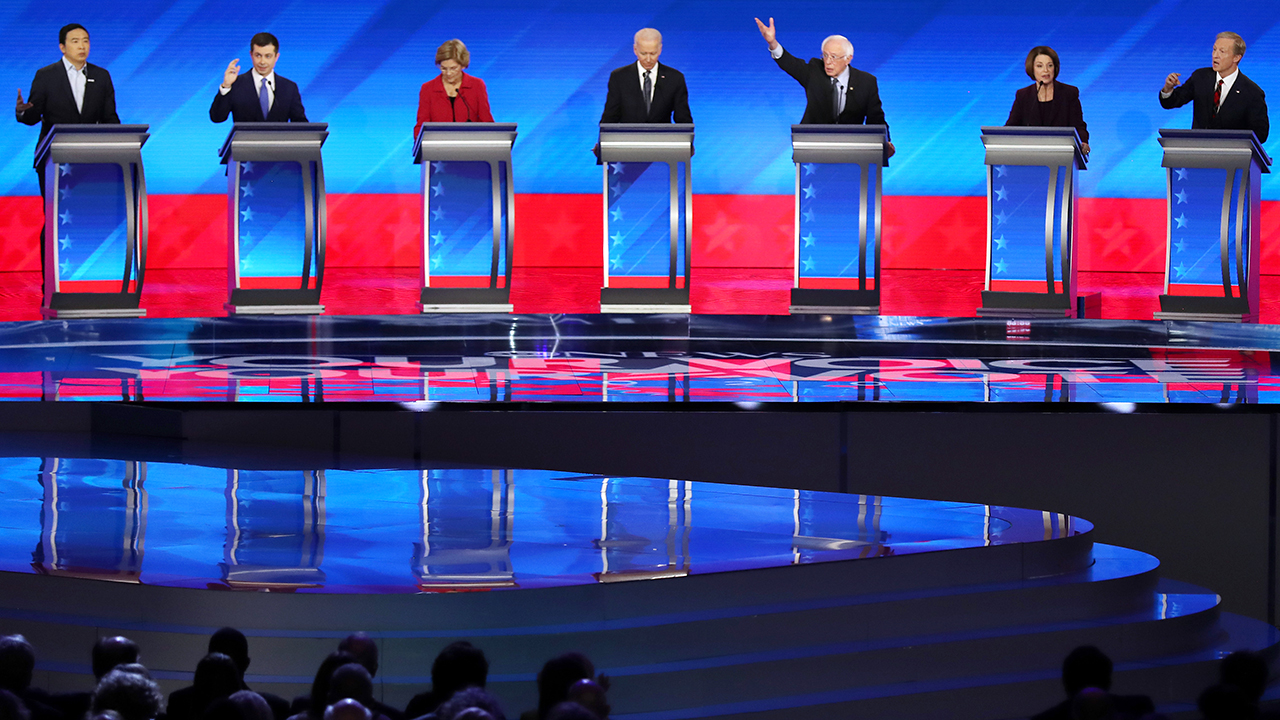
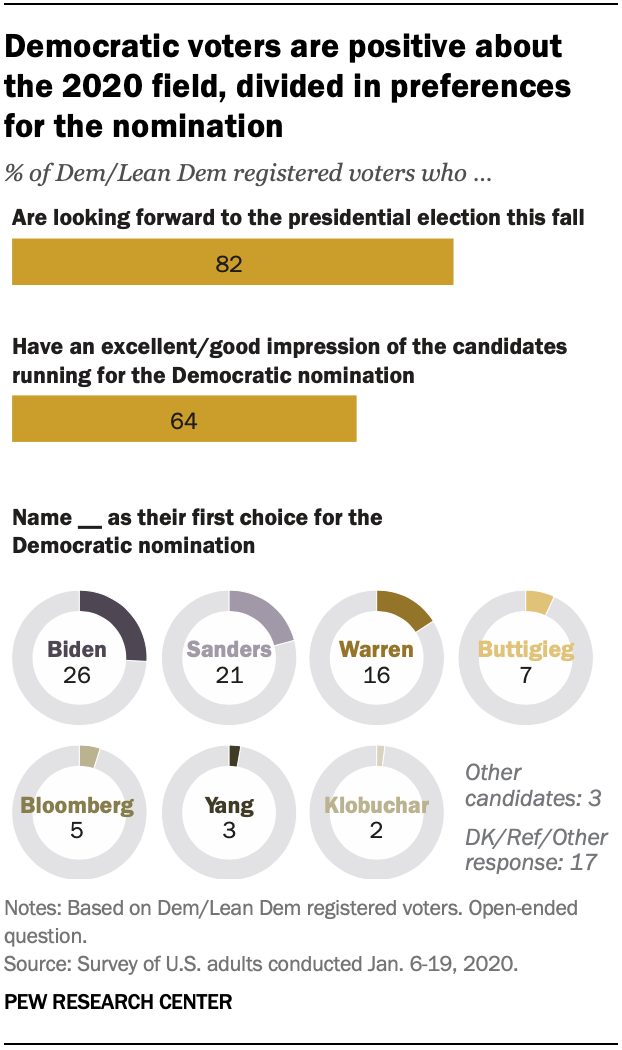 Democratic registered voters in the United States have a positive view of the field of candidates vying for their party’s presidential nomination, and they generally agree with each other on issues ranging from gun laws to climate change, according to a January Pew Research Center survey.
Democratic registered voters in the United States have a positive view of the field of candidates vying for their party’s presidential nomination, and they generally agree with each other on issues ranging from gun laws to climate change, according to a January Pew Research Center survey.
But as the race for the nomination heads to New Hampshire, Nevada and South Carolina, supporters of the major Democratic candidates stand apart from one another in notable ways. Below is a snapshot of some of these differences, based on the recent national survey of more than 10,000 U.S. registered voters, including nearly 5,900 Democrats or Democratic-leaning independents.
All findings in this analysis are based on the views of registered voters who are Democrats or lean to the party. Some candidates are not included due to sample size limitations.
This post analyzes the views of Democratic registered voters in the United States toward several candidates for the party’s presidential nomination. The analysis is based on a survey of 12,638 U.S. adults, including 10,491 registered voters (5,861 of whom are Democratic and Democratic leaners) in January 2020. Everyone who took part is a member of Pew Research Center’s American Trends Panel (ATP), an online survey panel that is recruited through national, random sampling of residential addresses. This way nearly all U.S. adults have a chance of selection. The survey is weighted to be representative of the U.S. adult population by gender, race, ethnicity, partisan affiliation, education and other categories. For more details, see the methodology for this report. Read more about Pew Research Center’s ATP here.
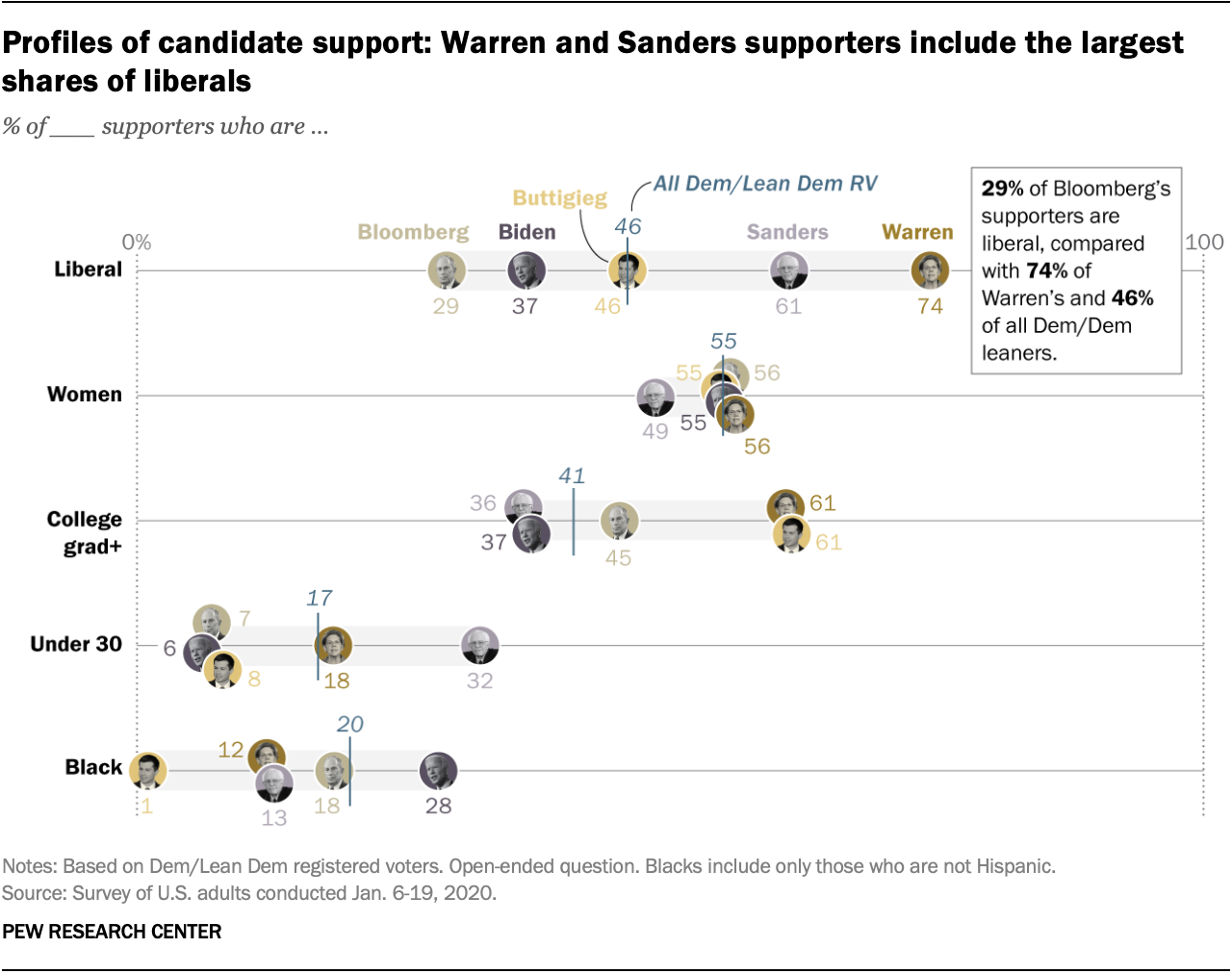
Joe Biden supporters
[callout align=”alignright”]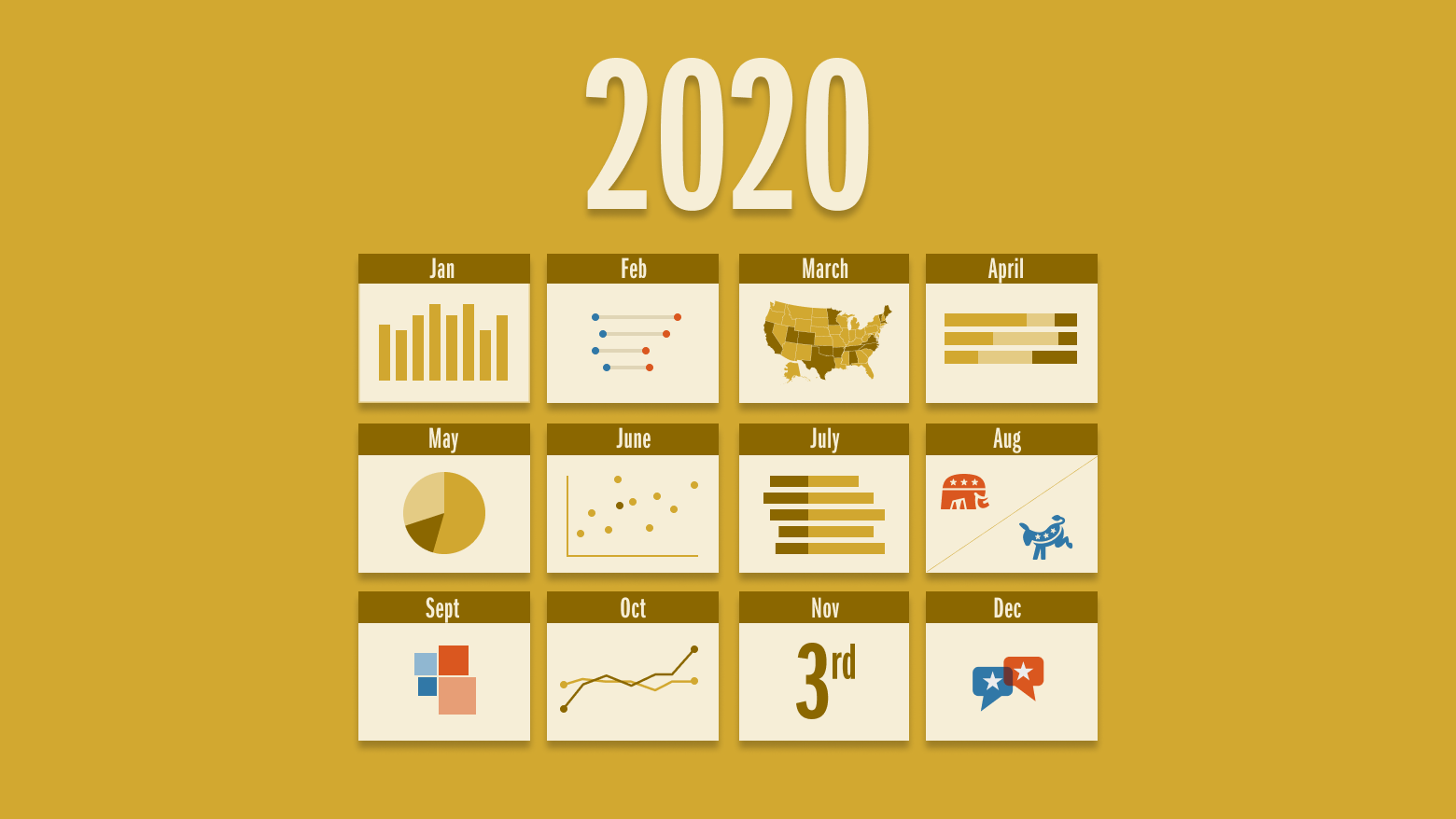
Want to keep up with trends shaping the 2020 U.S. presidential election?
Sign up to receive our monthly newsletter.
[/callout]- The former vice president draws comparatively high support from black adults and older Democratic voters. Nearly three-in-ten Biden supporters are black (28%), compared with smaller shares among those who back Michael Bloomberg (18%), Bernie Sanders (13%), Elizabeth Warren (12%) and Pete Buttigieg (1%). Biden’s supporters also include a larger share of voters ages 65 and older, compared with the backers of most of the other candidates.
- Most Biden supporters prioritize finding common ground with Republicans, even if it means giving up some things that Democrats want. Around seven-in-ten of his backers (72%) favor this approach over pushing hard for policies that Democrats want. Those who back Warren (53%) and Sanders (45%) are far less likely to take this view, though Bloomberg and Buttigieg supporters more closely resemble Biden’s in this respect.
- Biden supporters are more likely than backers of most other candidates to say illegal immigration is a very or moderately big problem in the country. Around six-in-ten Biden supporters (59%) take this view, compared with smaller shares of those who support Buttigieg (41%), Sanders (36%) and Warren (36%). Bloomberg supporters are about as likely as Biden backers to hold this view (61%).
Bernie Sanders supporters
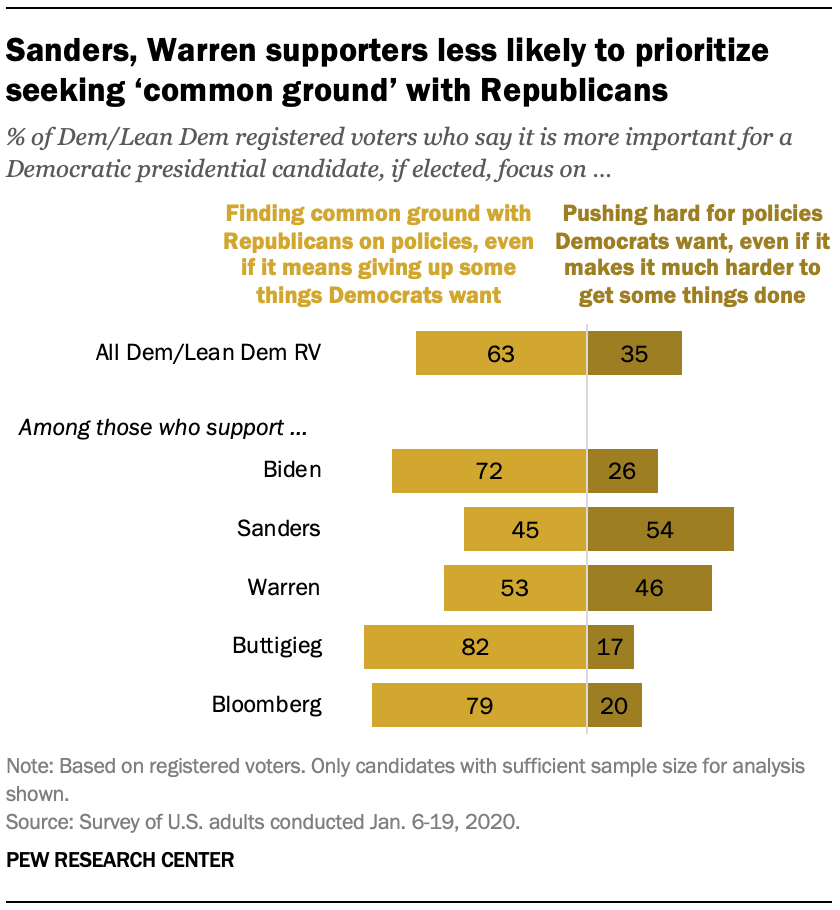 Around a third of Sanders supporters (32%) are under the age of 30, a higher share than among supporters of Warren (18%), Buttigieg (8%), Bloomberg (7%) and Biden (6%).
Around a third of Sanders supporters (32%) are under the age of 30, a higher share than among supporters of Warren (18%), Buttigieg (8%), Bloomberg (7%) and Biden (6%).- About half of Sanders supporters (54%) prioritize pushing hard for policies that Democrats want over finding common ground with Republicans. Among all Democratic voters, just 35% favor this approach.
- A slim majority (55%) of Sanders supporters say billionaires are a bad thing for the country, a view also held by 49% of Warren supporters. Buttigieg, Biden and Bloomberg supporters are much less likely to take this position.
Elizabeth Warren supporters
- Warren supporters are by and large well educated and politically liberal. When it comes to ideology, liberals make up a larger share of Warren’s supporters (74%) than any other Democratic candidate’s supporters, including those who back Sanders (61%).
- Among Warren supporters, 53% prefer that a candidate find common ground with the GOP, while 46% prefer someone who will push hard for Democratic policies. The share who want a candidate to push hard for Democratic priorities is slightly lower than the share of Sanders supporters who say this (54%), but is significantly higher than the shares of Biden, Buttigieg and Bloomberg supporters who take this view.
- Eight-in-ten Warren backers (80%) see economic inequality as a very big problem in the country today, similar to the share of Sanders supporters who say this (77%), and higher than the share of Biden (66%) and Buttigieg (65%) supporters with this view.
Pete Buttigieg supporters
- The former mayor of South Bend, Indiana, counts a high share of college graduates among his supporters. Around six-in-ten Buttigieg backers (61%) have a four-year college degree or more education – equal to the share among Warren supporters (61%), but higher than the share among supporters of Bloomberg (45%), Biden (37%) and Sanders (36%).
- Even more than Biden supporters, backers of Buttigieg prioritize finding common ground with Republicans even if it means giving up some things that Democrats want. Around eight-in-ten Buttigieg backers (82%) favor this approach over pushing hard for policies that Democrats want, even if it makes it much harder to get some things done. (Among Biden supporters, 72% say this.)
- While around three-quarters of Warren (76%) and Sanders (74%) supporters say the government should provide more assistance to people in need, Buttigieg supporters are divided on this question: 48% say the government should provide more assistance, while 45% say it is providing about the right amount of assistance.
Michael Bloomberg supporters
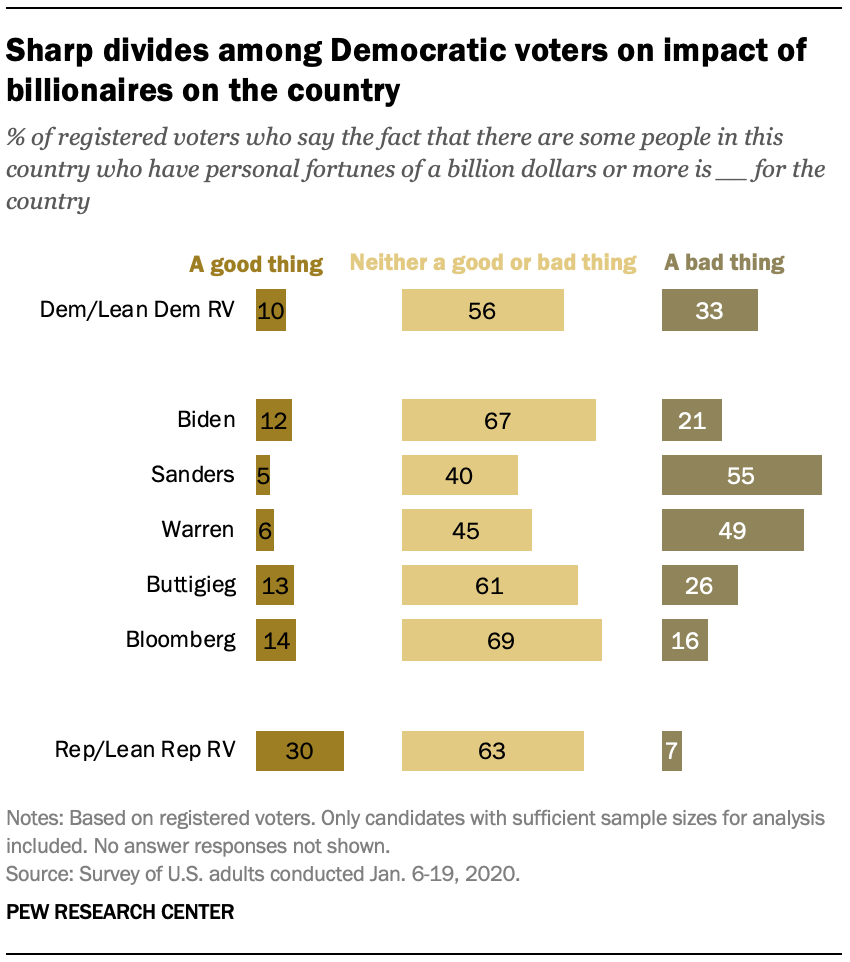 Bloomberg supporters are decidedly less liberal than the backers of most other Democratic candidates. Just 29% of Bloomberg supporters describe themselves as liberal; a majority identify as moderate or conservative.
Bloomberg supporters are decidedly less liberal than the backers of most other Democratic candidates. Just 29% of Bloomberg supporters describe themselves as liberal; a majority identify as moderate or conservative.- Like Buttigieg and Biden supporters, a clear majority of Bloomberg backers (79%) want a candidate who will prioritize finding common ground with Republicans, even if it means giving up some things Democrats want.
- Most Bloomberg supporters (69%) say the fact that some people in the U.S. have personal fortunes of a billion dollars or more is neither a good nor a bad thing for the country; just 16% call it a bad thing. Sanders and Warren supporters are far more likely to say billionaires are a bad thing for the country (55% and 49%, respectively, say this).
Note: Here are the questions used for this report, along with responses, and its methodology.



